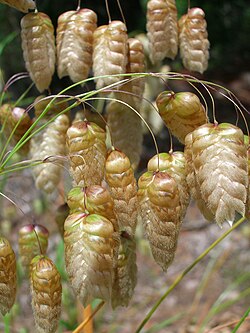From Wikipedia
Open on Wikipedia
| Briza maxima | |
|---|---|

| |
| Scientific classification | |
| Kingdom: | Plantae |
| Clade: | Tracheophytes |
| Clade: | Angiosperms |
| Clade: | Monocots |
| Clade: | Commelinids |
| Order: | Poales |
| Family: | Poaceae |
| Subfamily: | Pooideae |
| Genus: | Briza |
| Species: | B. maxima
|
| Binomial name | |
| Briza maxima | |
Briza maxima is a species of the grass genus Briza. It is native to Northern Africa, Western Asia and Southern Europe and is cultivated or naturalised in the British Isles, the Azores, Australasia, the western United States, Central and South America, and Hawaii.[1]
This species has a large number of common names, including big quaking grass, great quaking grass, greater quaking-grass,[2] large quaking grass, blowfly grass, rattlesnake grass, shelly grass, rattle grass, and shell grass.[3][4][1]
It grows to a height of 60 cm. Their spikelets resemble those of the unrelated species Bromus briziformis. The seeds and leaves are edible.[5]
References
[edit]Wikimedia Commons has media related to Briza maxima.
- ^ a b "Briza maxima". Germplasm Resources Information Network. Agricultural Research Service, United States Department of Agriculture. Retrieved 2007-10-18.
- ^ BSBI List 2007 (xls). Botanical Society of Britain and Ireland. Archived from the original (xls) on 2015-06-26. Retrieved 2014-10-17.
- ^ Joondalup Coastal Foreshore Natural Areas Management Plan Retrieved 2007-10-15.
- ^ Briza maxima. Archived August 28, 2007, at the Wayback Machine National Weeds Strategy. Retrieved 2007-10-15.
- ^ "Briza maxima". Survival and Self Sufficiency. Retrieved 9 September 2011.